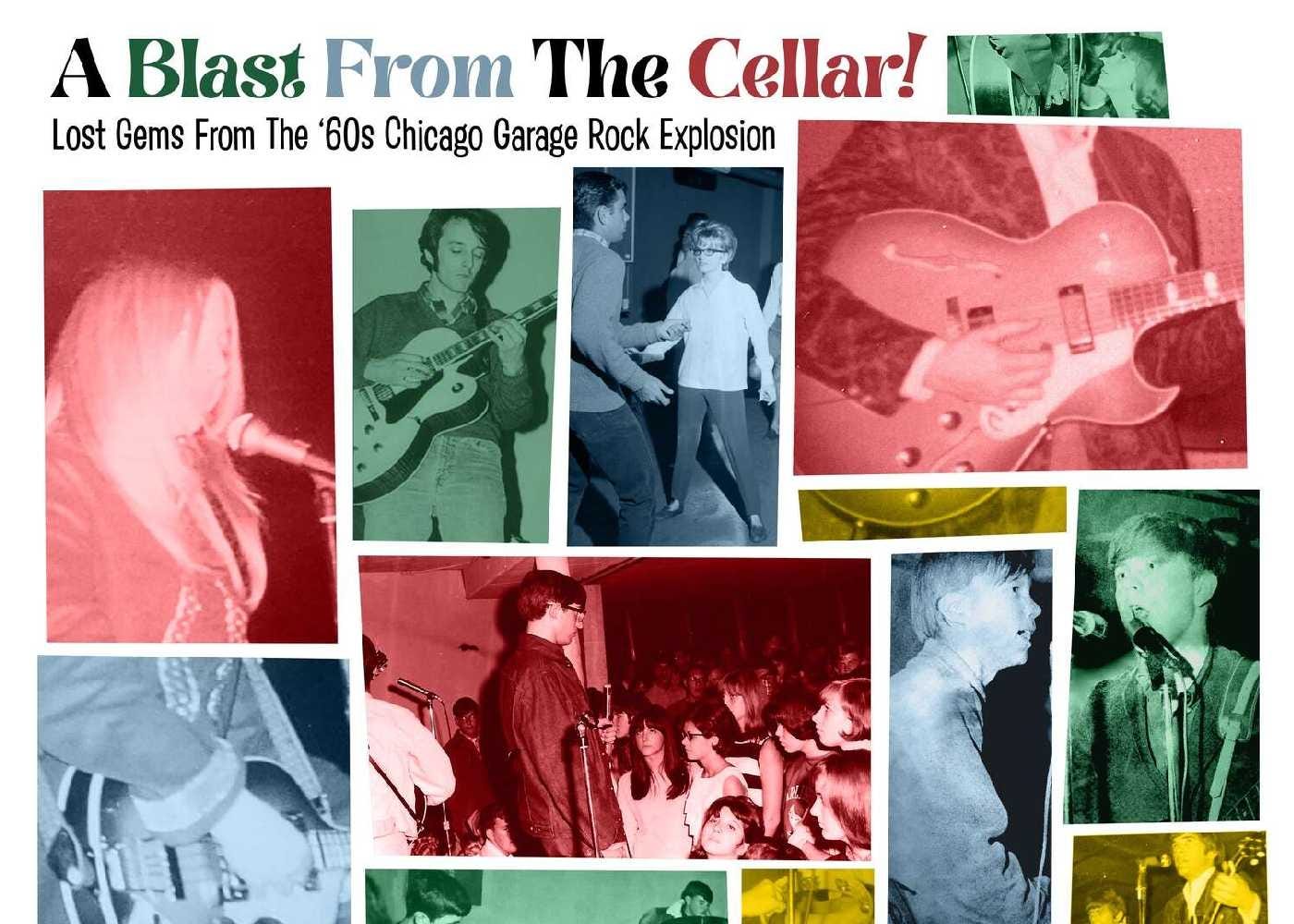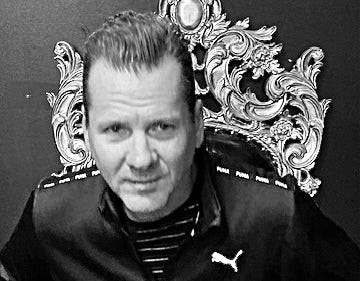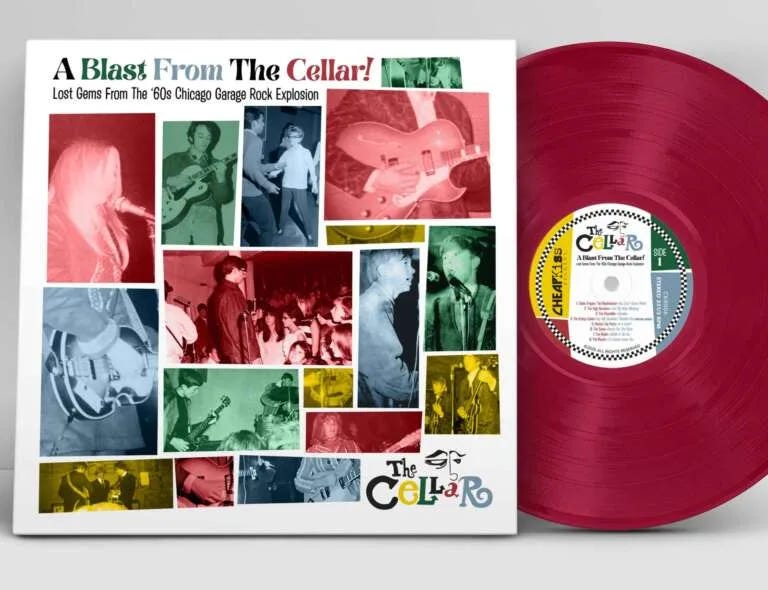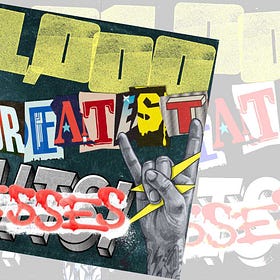Interview: Sean Hoffman
Discussing The Garage Rock Rarities Comp 'A Blast From The Cellar!'
I'm endlessly fascinated by small, regional music scenes like the one celebrated on the excellent new garage rock compilation A Blast From The Cellar.
The first few concerts I attended as a tween were arena shows, so that’s what I initially thought live music was about. My perspective changed after discovering punk in my teens and experiencing the in-your-face power of stripped down club gigs.
That’s the pure, unbridled energy I hear when listening to these lost gems six decades after they were recorded. The Cellar club is long gone, but I immediately connected with the lightning in a bottle moment this compilation so beautifully captures.
“The Cellar was opened by Paul Sampson, the owner of a small record store in Arlington Heights, IL in 1965 as a home base for The Shadows of Knight, a young band that had developed a devoted following among the local teens that frequented his shop,” the comp’s co-producer Sean Hoffman told me for the interview below.
In addition to talented local teens, The Cellar featured early U.S. tour dates by The Who, Cream, and The Yardbirds, among many others.
“Not only did The Cellar host rock royalty like Townshend, Clapton, and Page, but eventually blues legends like Muddy Waters and Howlin' Wolf made their way from the South Side of Chicago to the northwest suburbs, to play alongside of the young musicians they had inspired,” Hoffman said, pointing out that it didn’t last long.
“The large crowds of exuberant teenagers were too much for the village authorities, especially in the charged atmosphere of late ‘60s America following the Kennedy and King assassinations and the 1968 Democratic Convention Riots in Chicago. Sampson faced constant struggles to keep his club open, despite its popularity. He eventually decided to close the doors in June of 1970.”
The rest, as they say, is history…but now it’s also a killer compilation from Cheap Kiss Records. I caught up with Hoffman by email to discuss the history of The Cellar, his inspiration for curating this compilation, and his ongoing book project.
Sean Hoffman Interview
Can you tell me a bit about the history of The Cellar?
Sean Hoffman: After promoting a handful of successful concerts by The Shadows of Knight at sub-par venues that were packed to capacity, he thought that a permanent venue for the band could be popular. The teenager only club (no alcohol, no adults except for the security, provided by in-uniform police officers) was so successful that he quickly had to move into a larger building.
The Shadows of Knight also outgrew the original club after their hit single "Gloria" was released in the spring of 1966 and went out on tour. Sampson brought in new house bands that he managed like Saturday's Children, The Males, and The Mauds, and they quickly won over the club regulars, commonly referred to as Cellar Dwellers.
What was the inspiration to take this vinyl compilation project on?
Sean Hoffman: I was doing research for a book on The Cellar and ended up meeting Bill St. John, the co-producer of the record, through social media. His band, High Numbers, had played at The Cellar, and he happened to be the younger brother of my Godfather and a friend of my Father's. He had just rediscovered the original master recording of the single he had recorded in 1966, and we started wondering how many other people were sitting on unreleased or unheard music from that time and place?
I'm originally a DJ, and while researching the book I started collecting all the records I could find from the local bands that had played there regularly, and I was blown away by how good the music was, and the fact that it had never been reissued anywhere. We eventually were able to track down stuff that had never been released at all from some of these same bands, and we thought that it deserved to be heard.
This is a garage rock mop comp, but the first track is very Beatles-y. Why was that the right song to launch this collection?
Sean Hoffman: The Beatles spawned the whole garage rock era, everyone I spoke to talked about their influence and how they inspired the creation or direction of their band. They were the spark that started a thousand fires.
What can you tell me about The Blackstones?
The Blackstones were started in Hammond, IN by Jeff Boyan, a young songwriter inspired by The Beatles Ed Sullivan appearance. While most bands of the era were playing covers, he was writing original songs that were clearly influenced by The Beatles, but stood on their own merits. Featuring the brilliant guitar work of Jerry McGeorge, The Blackstones recorded three incredibly rare singles for Invictus Records, their manager's label. After a dispute with another Chicago band called The Blackstones, and in an effort to make the band appear more "British,” Jeff Boyan was rechristened as Geoff Bryan, and the band was renamed Dalek/Engam: The Blackstones, Dalek from Dr. Who, Engam for English American.
They caught the attention of many fans and club owners around the Chicago area, including Paul Sampson, who encouraged Bryan to put together a new band after The Blackstones broke up when their drummer was drafted. Jerry McGeorge joined The Shadows of Knight and provided the unforgettable lead guitar part on "Gloria,” while Bryan formed Saturday's Children and became the new house band at The Cellar. They would play together again years later in the psychedelic band HP Lovecraft.
The Shandells' "Caroline" is a standout track that really captures the core garage rock sound of this compilation. Why do you think great tracks like this fall into obscurity?
Sean Hoffman: For many bands at that time, they didn't have the number of options that exist today to reach an audience. The local teen club scene was thriving, but there were many great bands and the competition was fierce. Even if they were lucky enough to score financing for a record (always a single at that time), there were only a few radio stations that even played rock and roll then. Touring was also in its infancy, and national promoters and booking agents were not yet common. In the case of The Shandells, they were 15 year old high school students, so their reach was limited.
"Never Feel The Pain" by Saturday's Children perfectly splits the difference between garage rock and British Invasion pop. Do you have any idea how this one was recorded?
Sean Hoffman: Originally written for and recorded by The Blackstones, this version is an unreleased demo recorded by Saturday's Children during one of their sessions at Universal Recording Studios, the home of the legendary Dunwich Records. Finding the alternate versions of both of these Bryan songs, recorded by both of his bands, was especially exciting.
What were some of the challenges with putting this collection together 60 years later?
Sean Hoffman: The different sources for these songs ranged from cassettes to reel to reels, from 45 rpm 7-inch singles to lacquer masters. The engineer, Liam Davis, did a phenomenal job of transferring and cleaning up everything. Tracking down the copyright owners and musicians was also challenging.
What's next for you and A Blast From The Cellar?
Sean Hoffman: I'm still working on The Cellar book, due to be released in 2026 by Hozac Books. The feedback and reviews for the record so far have been amazing, we have a sold out record release party coming up October 15th and I have already started work on A Blast From The Cellar Vol. II, which will feature a whole bunch of new discoveries!
Interview: 1,000 Greatest Misses
I don’t usually rely on podcasts to (re)discover great guitar pop artists and songs from the past, but 1,000 Greatest Misses is definitely an exception.






